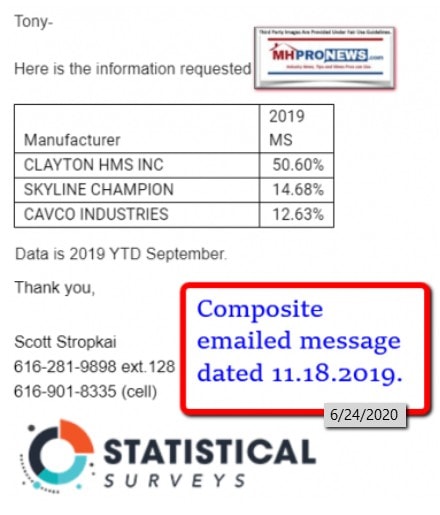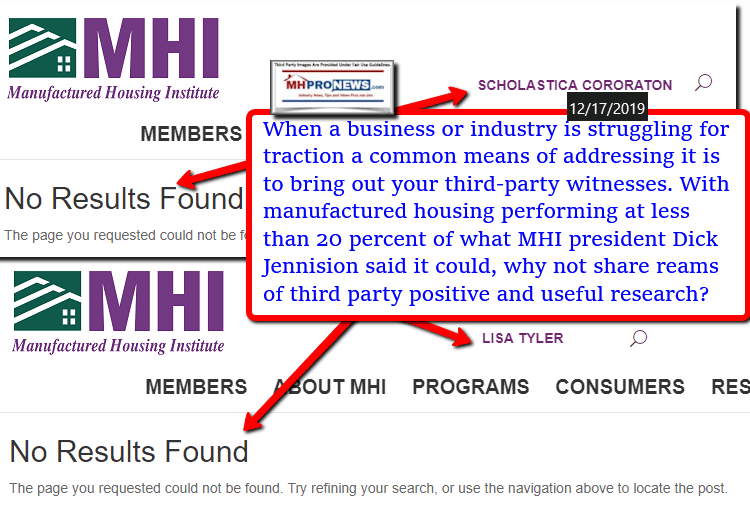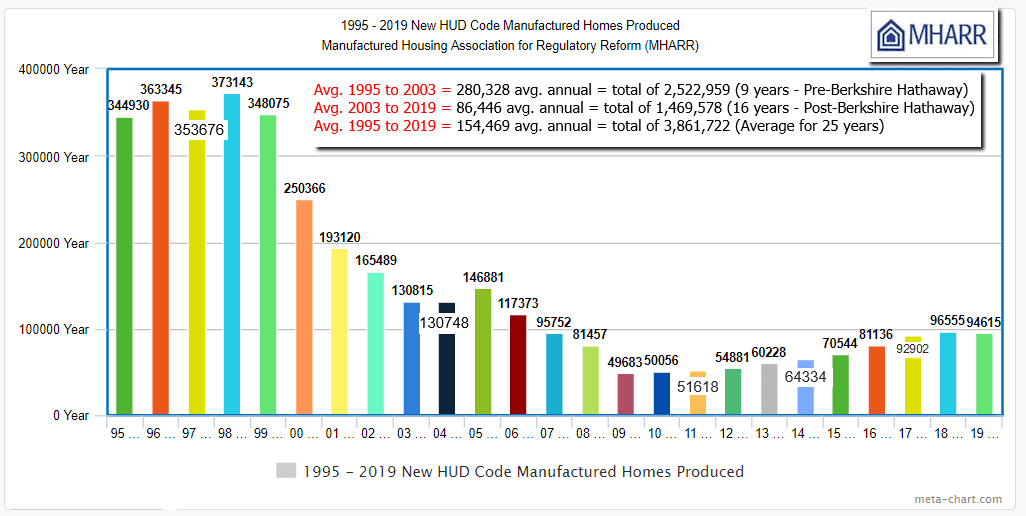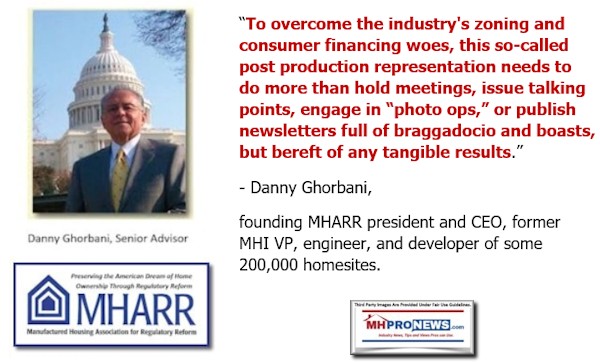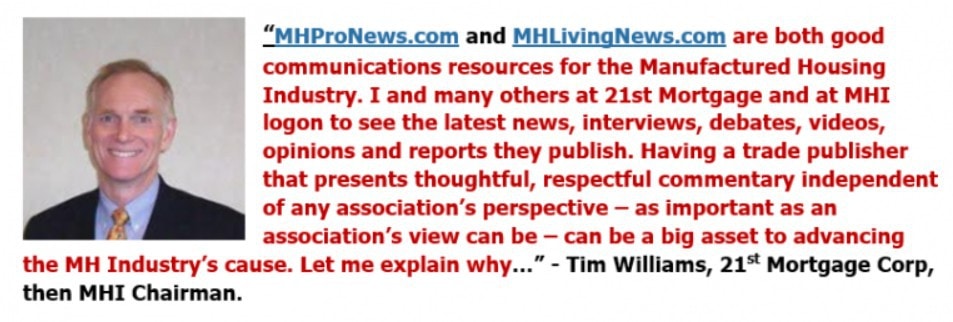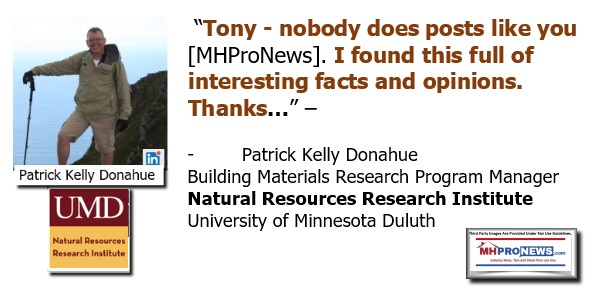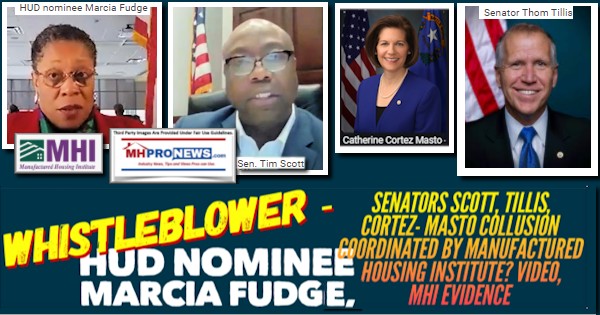
The solution for the affordable housing crisis has been hiding in plain sight for decades. There are clear examples of widespread agreement between numerous members of both major parties that more affordable home ownership would be good for minorities and all those with lower incomes. Democrats and Republicans have often agreed that modern manufactured homes are that proven path. That begs the question. When literally decades of research by third parties reflect that manufactured homes are already the most proven form of permanent affordable home ownership, and existing laws – at least on paper, already make financing and placement of more home ownership possible – then why has there been years of delays in making what many agree is desirable a reality rather than a mere hope or policy position?
That backdrop serves to illustrate that ‘collusion’ can occur in several ways. The word ‘collusion’ can also have several possible meanings, ranging from innocent to problematic, which will be explored herein.
It is against this background that a tipster’s insights to MHProNews are relevant. That whistleblowing source has provided evidence both subtle and purportedly brazen on the part of the Manufactured Housing Institute (MHI) and whomever at that trade organization was involved that directed the matters that led to this episode that is about to be exposed in this report and analysis.
Affordable housing and more home ownership are goals long championed by both major parties. While the rate of home ownership has been rising since 2016, it is still lower than it was in 2000. Which also begs a question. Why have there been gyrations up and down but overall negative progress in the past two decades toward more home ownership? Even a brief mention that the 2008 housing/finance crisis demonstrated that financing higher levels of less or unaffordable homes has proven to be problematic. So called ‘liar loans’ or gimmicks to briefly juice home ownership end up in a wave of foreclosures and repossessions later that magically end up in the hands of private equity. Gimmicks with conventional housing have never been an authentic and stable solution.
Affordability, financing, zoning, placement and understanding the macro and granular issues are all keys. To grasp the recent developments about to be revealed, historic as well as legal context are useful and necessary.
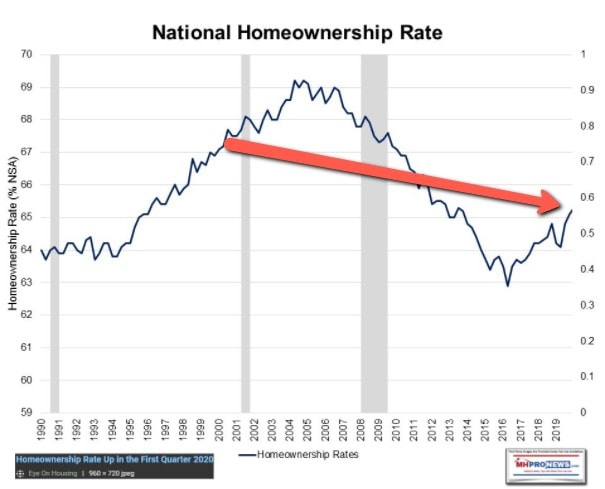
This report will begin with legal insights from a letter that Democratic Representative Maxine Waters (CA-D) and several of her House colleagues signed to then HUD Secretary Mel Martinez. Waters and company wrote the following to the Bush-Cheney (R) Administration era HUD Secretary Martinez. Their specific topic was manufactured housing, which they then and more recently agreed is a necessary resource for more affordable housing and thus more affordable homeownership.
“Dear Secretary Martinez:
We are writing to express our deep disappointment in HUD’s July 17 rejection of the Manufactured Housing Consensus Committee [MHCC] recommendation, which addresses the problem in the siting of manufactured homes. We ask HUD to use its expanded authority under the “Manufactured Housing Improvement Act of 2000” to address this growing problem, which is undermining homeownership opportunities for low-income and minority Americans.”
The same problem identified then is still widely acknowledged to exist today. That is confirmed by lawmakers, policy advocates, home ownership rate graphics – like the one above – as well as by industry professionals.
Two pull quotes from MHI connected sources confirm the contemporary problem, before pivoting back to the congressional letter to HUD Secretary Martinez introduced above.
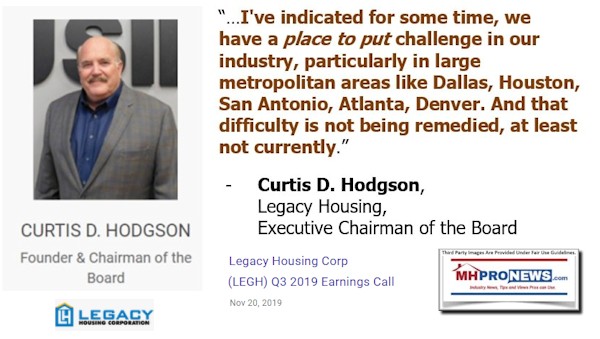
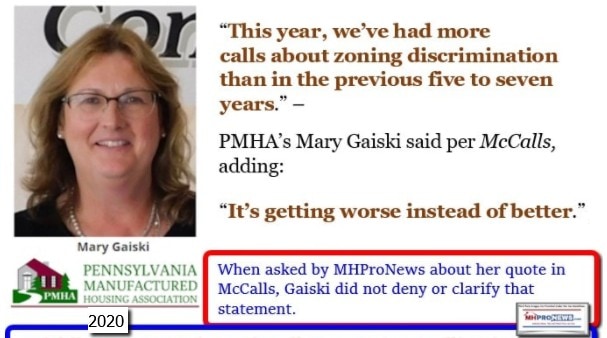
That current context observed, and returning to the letter above, note that there was no ambiguity in the message dated November 13, 2003 from Congressional Reps Waters and her colleagues to Secretary Martinez. The letter in a matter of fact fashion related what the “Manufactured Housing Improvement Act of 2000” (MHIA or 2000 Reform) law states. The mention of the MHCC was part of the 2000 Reform law. Those Democratic lawmakers oversight letter to HUD goes on to emphasize and address specifics.
“You have made homeownership a top Administration priority, emphasizing opportunities for low-income Americans,” wrote those Democratic lawmakers. As was previously noted, that statement of making “homeownership a top Administration priority” is one that both Democratic and Republican administrations alike routinely claim they want. The Biden-Harris White House has recently asserted something similar too.
Waters and her colleagues letter elaborated: “The very first recommendation of the Manufactured Housing Consensus Committee [MHCC – part of what the 2000 Reform law established] addressed the problem of discrimination against localities enforcing discriminatory covenants made by private landowners. We believe HUD’s summary rejection of this proposal is inconsistent with HUD’s stated priority of removing barriers to affordable low-income homeownership opportunities.
We understand that HUD may have concerns about its legal authority to implement this particular proposal. But, we believe that HUD should have taken this opportunity to use its expanded legal preemption authority under the [MHIA] 2000 Act to develop a Policy Statement or regulation to make it clear that localities may not engage in discriminatory practices that unfairly inhibit or prohibit development and placement of manufactured housing. We understand that some in the industry have asked HUD to take action and we urge HUD to be responsive to this request.”
Notice that those Democratic lawmakers who sent that to then Secretary Martinez were part of the coalition that passed the 2000 Reform law. That’s important due to the notion of legislative intent. If there is doubt about a meaning of a law, legislative intent is part of what that is clarified.
Those lawmakers in their oversight capacity stressed that the 2000 Reform law was not being properly implemented by the Bush-Cheney era HUD Secretary Martinez. They specifically protested that HUD had been given “expanded legal preemption authority under the [MHIA] 2000 Act to develop a Policy Statement or regulation to make it clear that localities may not engage in discriminatory practices that unfairly inhibit or prohibit development and placement of manufactured housing.”
The importance of that passage of the letter and others will be made clear in the light of recent events on Capitol Hill with respect to “NIMBY” or “Not in My Back Yard” behavior and claims of market limiting collusion.
Noting that HUD used various excuses in failing to utilize the 2000 Reform law as intended, and how HUD officials errantly relied upon pre-MHIA 2000 guidance, the lawmakers urged the following. Their next passage from that historic letter makes it clear that the HUD Secretary and the agency he leads had the statutory authority to do more than was then taking place during the Bush-Cheney administration.
That is critical to grasp, because the 2000 Reform law stands. So what follows is as applicable now as it was then.
Here is what they wrote. “The 2000 Act broadened this provision to add that: “Federal Preemption under this subsection shall be broadly and liberally construed to ensure that disparate State or local requirements or standards do not affect the uniformity and comprehensiveness of the standards promulgated under this section nor the Federal superintendence of the manufactured housing industry established by this title.” [italics added].” Those italics and the bracketed comment are in their original letter.
The full letter and additional context around the notion of collusion are found in a related deep dive report linked below.
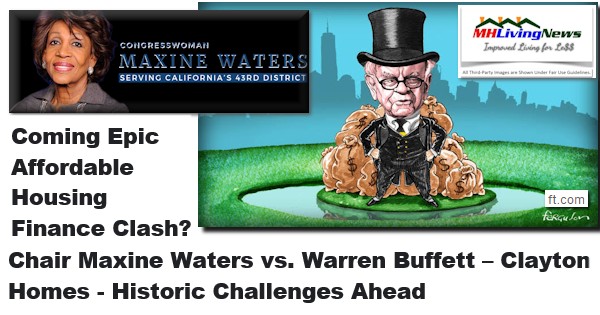
These next two bullets are also quotations from that same letter to Secretary Martinez, which can be found in full context in the report linked above.
- “Thus, the 2000 Act expressly provides, for the first time, for “Federal preemption,” and states that this should be “broadly and liberally construed” to ensure that local “requirements” do not affect “Federal superintendence of the manufactured housing industry.””
- That letter also stressed that, “The 2000 Act amendments introduced the new findings that “manufactured housing plays a vital role in meeting the housing needs of the nation” and that “manufactured homes provide a significant resource for affordable home ownership.” New purposes were also introduced by the 2000 Act, which includes protecting the “affordability of manufactured homes,” and “facilitating the availability of affordable manufactured homes and to increase homeownership for all Americans.”’
From that foundation in 2003, fast forward to July 18, 2019.
The following is a portion of a letter from then MHI Executive Vice President (EVP) Lesli Gooch, Ph.D., who is now MHI’s CEO. It was addressed to then HUD Secretary Ben Carson, M.D.
Gooch wrote: “4) HUD Must Implement and Enforce its Enhanced Preemption Authority
MHI Proposes that HUD shall issue a revised and updated policy statement regarding the Department’s position concerning preemption and state and local zoning, planning, or development restrictions that either several limit or outright prohibit manufactured housing.”
It is worth underscoring that Gooch’s letter came after months of MHProNews and our MHLivingNews sister site pounding on this issue of zoning and placement problems which could have arguably been resolved by applying HUD’s federal “enhanced preemption” provision of the 2000 Reform law.
It is also important to acknowledge that she made that comment after years of public efforts by the Manufactured Housing Association for Regulatory Reform (MHARR) to make the obvious intent of the 2000 Reform law a reality. So, Gooch’s statement that follows was not made in a vacuum, there were a variety of forces at play that shed light on what she wrote.
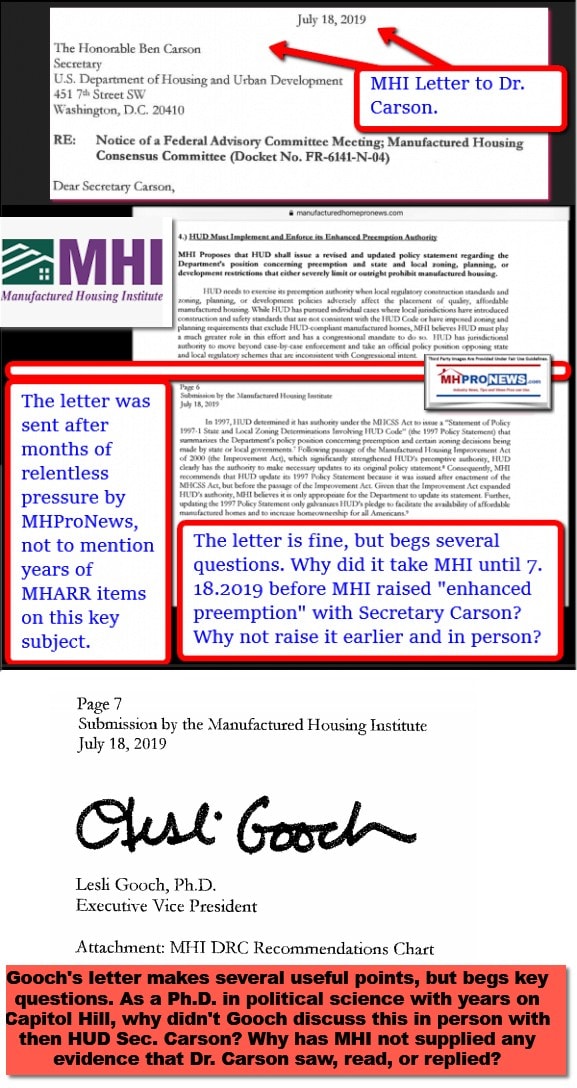
Returning to what Gooch wrote Sec. Carson, “HUD needs to exercise its preemption authority when local regulatory constructions standards and zoning, planning, or development policies adversely affect the placement of quality, affordable, manufactured housing. While HUD has pursued individuals cases where local jurisdictions have introduced construction and safety standards that are not consistent with the HUD Code or have imposed zoning and placement requirements that exclude HUD compliant manufactured homes, MHI believes HUD must play a greater role and has a congressional mandate to do so.”
That mandate Gooch pointed to is obviously part of the law referenced above by Rep. Waters and her House colleagues in 2003.
Gooch went on to say, “HUD has jurisdictional authority to move beyond case-by-case enforcement and take an official policy position opposing state and local regulatory schemes that are inconsistent with Congressional intent.” Legally and logically speaking, quite so.
Thus – on paper, Gooch on behalf of MHI – made a similar argument to the one made some 16 years prior by Democratic lawmakers, by MHARR, and others in the industry who had been involved in the passage of the 2000 Reform law. It is still part of the argument made by those in the know who wanted to see that potentially useful law fully and properly implemented.
There is no denying that Gooch understands the terminology or that portion of the Manufactured Housing Improvement Act of 2000 law (MHIA or 2000 Reform Law). But if there would be any doubt, beyond the reference above, MHI’s Gooch also raised the topic to Edward Golding when he was at HUD. Golding later went on to join the Urban Institute. The report linked below details that related matter and further confirms Gooch’s understanding of HUD’s statutory authority to exercise federal “enhanced preemption.” This fine legal point is one of the keys to understanding what is problematic about the federal hearing involving HUD nominee Fudge and specific senators.
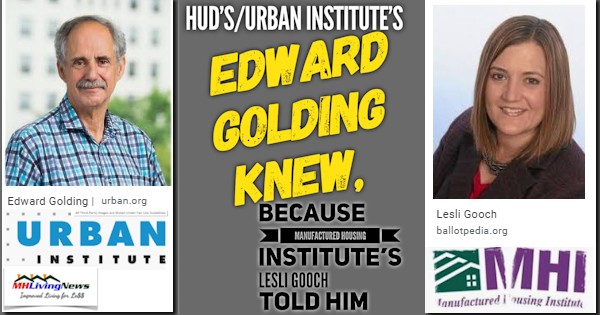
For clarity, to sum up to this point.
- Then Rep. Waters, her House colleagues, MHARR, and others where finally joined – on paper – by MHI’s then EVP but now current CEO Gooch.
- All of them on paper referenced the importance and potential value 2000 Reform law.
- Each specifically pointed to the “enhanced preemption” provision of the MHIA.
- While home ownership has risen since 2016, it is overall lower today than when the 2000 Reform law was enacted.
- They all understood that HUD has the statutory authority to remove local zoning and placement roadblocks.
- When third party research, including by Democratic and Republican lawmakers all agreed on the value of modern manufactured housing, what went wrong?
- Why did it take MHI years to raise in a letter – that may or may not have been read by HUD Sec. Carson – what they could have done in person with Dr. Carson several times, and in person? Or why didn’t MHI raise that issue with prior Administrations?
- When there are several examples of third party research useful for clarifying various concerns about manufactured housing, why are they routinely missing from MHI’s own website?
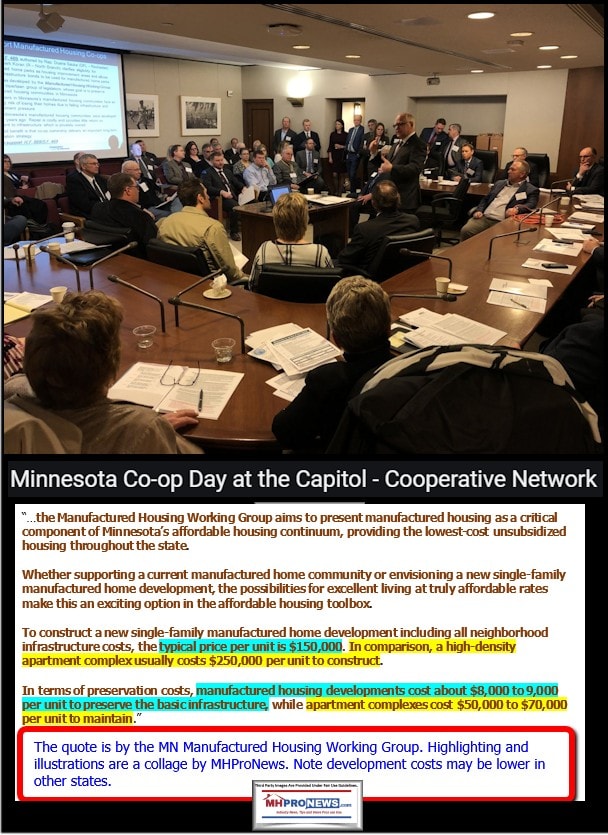
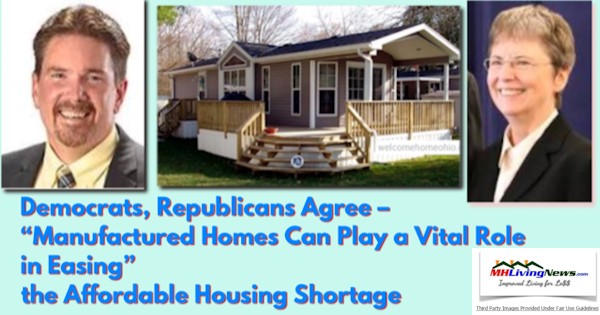
That historic context is explored in more depth in the report linked below. But the above has sufficiently established the facts to beg the following questions and concerns relative to the recent HUD nomination hearing that will become the focus of this report.

Based upon the context above, how does someone explain what Rep. Marcia Fudge (OH-D) said in her confirmation HUD Senate testimony, as reported by MHI?
Based upon her statements, Rep. Fudge seems supportive of manufactured housing. But Rep. Fudge then makes an odd statement, given the legislative intent and legal background established above.
A careful look at the full text from MHI’s email to their members on 1.28.2021 will uncover a glaring inconsistency with the facts and legal arguments laid out above.
Per MHI, “Senators from both sides of the aisle questioned President Biden’s Nominee for HUD Secretary, Representative Marcia Fudge, about manufactured housing today during her nomination hearing. Testifying before the U.S. Senate Banking Committee, Fudge called manufactured housing an “outstanding option,” and she touted its affordability and efficiency. She told the Senate Committee that she is “100% supportive” of looking at incorporating manufactured housing into the Department’s affordable housing strategies.
Fudge also told the Committee that addressing exclusionary zoning is a priority. She testified that “we have to get rid of the idea of “Not in my Backyard.” While acknowledging as a former mayor that this will be difficult, she discussed the need to find incentives for home builders to work with HUD and local lawmakers to change zoning laws.
In advance of today’s hearing, MHI worked with members of the Senate Banking Committee to have manufactured housing a key topic of discussion. MHI also recently met with Fudge to discuss the role that manufactured housing serves in addressing the affordable housing shortage in the country and encouraging her to ensure HUD facilitates the availability of manufactured housing for all Americans, as required by law.”
In a subsequent email from MHI to their members, they wrote the following, which amplified some of the same points.
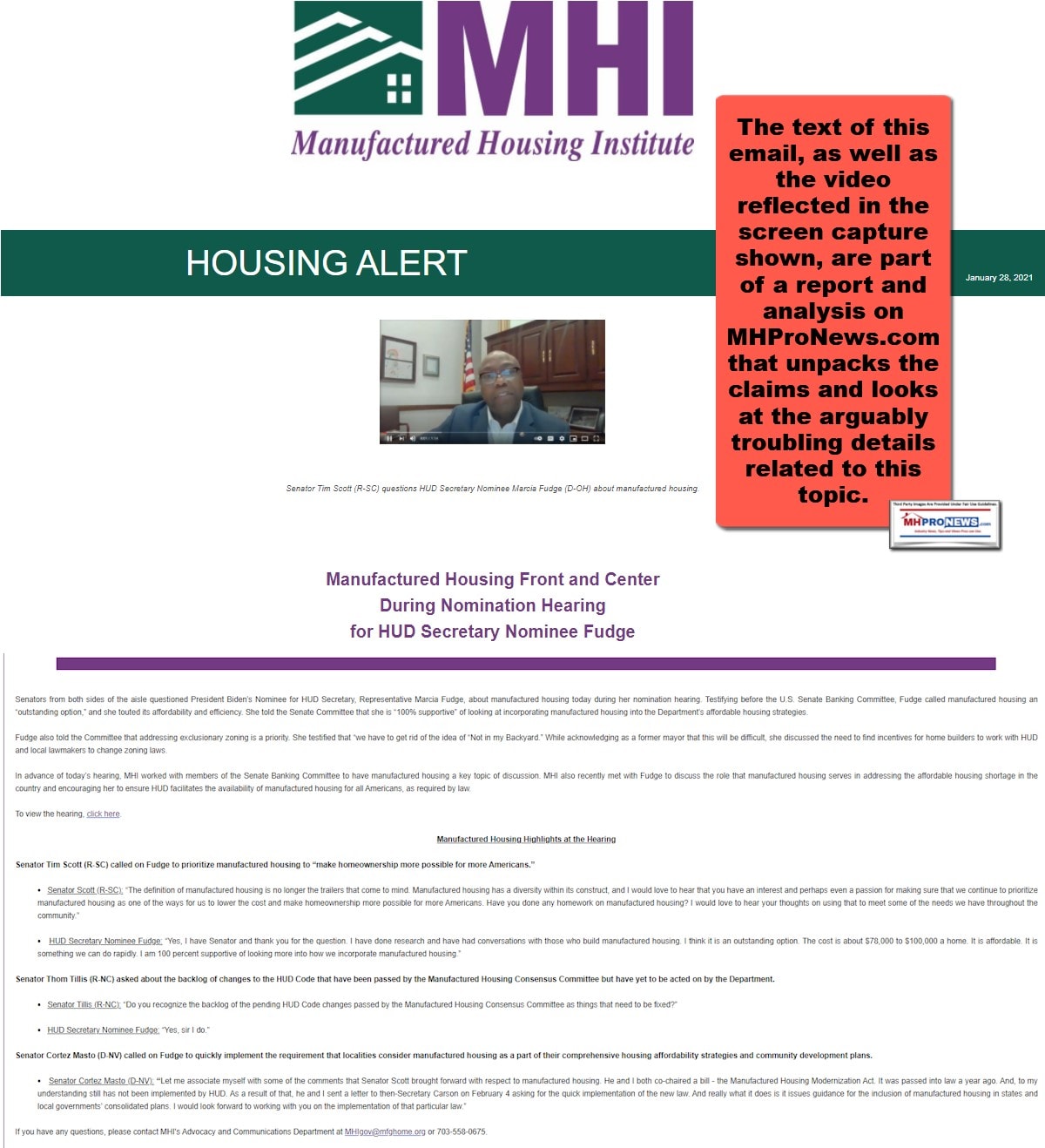
Per their email, MHI asserted this.
Manufactured Housing Highlights at the Hearing

Senator Tim Scott (R-SC) called on Fudge to prioritize manufactured housing to “make homeownership more possible for more Americans.”
- Senator Scott (R-SC): “The definition of manufactured housing is no longer the trailers that come to mind. Manufactured housing has a diversity within its construct, and I would love to hear that you have an interest and perhaps even a passion for making sure that we continue to prioritize manufactured housing as one of the ways for us to lower the cost and make homeownership more possible for more Americans. Have you done any homework on manufactured housing? I would love to hear your thoughts on using that to meet some of the needs we have throughout the community.”
- HUD Secretary Nominee Fudge: “Yes, I have Senator and thank you for the question. I have done research and have had conversations with those who build manufactured housing. I think it is an outstanding option. The cost is about $78,000 to $100,000 a home. It is affordable. It is something we can do rapidly. I am 100 percent supportive of looking more into how we incorporate manufactured housing.”
Senator Thom Tillis (R-NC) asked about the backlog of changes to the HUD Code that have been passed by the Manufactured Housing Consensus Committee but have yet to be acted on by the Department.
- Senator Tillis (R-NC): “Do you recognize the backlog of the pending HUD Code changes passed by the Manufactured Housing Consensus Committee as things that need to be fixed?”
- HUD Secretary Nominee Fudge: “Yes, sir I do.”
Senator Cortez Masto (D-NV) called on Fudge to quickly implement the requirement that localities consider manufactured housing as a part of their comprehensive housing affordability strategies and community development plans.
- Senator Cortez Masto (D-NV): “Let me associate myself with some of the comments that Senator Scott brought forward with respect to manufactured housing. He and I both co-chaired a bill – the Manufactured Housing Modernization Act. It was passed into law a year ago. And, to my understanding still has not been implemented by HUD. As a result of that, he and I sent a letter to then-Secretary Carson on February 4 asking for the quick implementation of the new law. And really what it does is it issues guidance for the inclusion of manufactured housing in states and local governments’ consolidated plans. I would look forward to working with you on the implementation of that particular law.”
##
From MHI’s 2.3.2021 emailed “News and Update” under the heading of “MHI in Action” was this item.
Manufactured Housing Front and Center
During Nomination Hearing
for HUD Secretary Nominee Fudge

Senators from both sides of the aisle questioned President Biden’s Nominee for HUD Secretary, Representative Marcia Fudge, about manufactured housing during her nomination hearing. Testifying before the U.S. Senate Banking Committee, Fudge called manufactured housing an “outstanding option,” and she touted its affordability and efficiency. She told the Senate Committee that she is “100% supportive” of looking at incorporating manufactured housing into the Department’s affordable housing strategies.
Fudge also told the Committee that addressing exclusionary zoning is a priority. She testified that “we have to get rid of the idea of ‘Not in my Backyard’.” While acknowledging as a former mayor that this will be difficult, she discussed the need to find incentives for home builders to work with HUD and local lawmakers to change zoning laws.
In advance of the hearing, MHI worked with members of the Senate Banking Committee to have manufactured housing a key topic of discussion. MHI also recently met with Fudge to discuss the role that manufactured housing serves in addressing the affordable housing shortage in the country and encouraging her to ensure HUD facilitates the availability of manufactured housing for all Americans, as required by law.
## End of quoted text from MHI email. ##
For emphasis, look at the last paragraph from MHI that was posted above.
- “In advance of the hearing, MHI worked with members of the Senate Banking Committee to have manufactured housing a key topic of discussion.”
- “MHI also recently met with Fudge to discuss the role that manufactured housing serves in addressing the affordable housing shortage in the country and encouraging her to ensure HUD facilitates the availability of manufactured housing for all Americans, as required by law.”
In fairness, the case can be made that while MHI is seeking to grab credit for having arranged those questions and the answer from nominee Fudge, that is in keeping with lobbying practices by those who know Washington, D.C. from the inside.
To illustrate that point, from the book, “Lobbying: The Art of Influence” is this pull quote: lobbyists often “write testimony for some of them [i.e.: witnesses], and provide questions for legislators to ask witnesses.” That is what MHI said they did, per those two bullets above. They provided questions and even the answers. That part is not unusual and is believable.
Similar to the book reference, in American Government “Cliff Notes” said: “Interest groups not only report developments or trends but also try to influence them in a manner that benefits their members or the cause they support…” That source goes on to say that: “Lobbyists testify at committee hearings, provide the staff with information, and, more frequently than most people realize, actually write the legislation.”
To put those two examples in the context of the Fudge nomination hearing, the manufactured housing Q&A was scripted in advance. MHI’s own message, as cited above, addressed to their members suggests as much.

The “Iron Triangle”
Cliff Notes goes on to say that “The term iron triangle (also known as a cozy triangle) describes the ties between congressional committees, administrative agencies whose funding is set by the committees, and the lobbyists who work closely with both.” Gooch worked on Capitol Hill. She also has a doctorate degree in Political Science. She is or should be conversant with such matters. Unless she is inept, she is doubtlessly aware of how the sausage is made.
Put differently and for emphasis, MHI suggested that a significant part of what occurred at Fudge’s hearing was scripted in advance. Senators Tim Scott (SC-R) and Thom Tillis NC-R) also are among the legislators that were paid political action committee (PAC) money by the MHI PAC in recent election cycles, per Open Secrets.
Hold those thoughts, because there are several possibilities as to what that the above implies and how it relates to what follows. Because arguably none of the possible implications are good.
At a minimum, it might mean that despite her statement, nominee-Fudge was/is unaware of the 2000 Reform law and one of the MHIA’s key provisions. Namely, HUD’s federal enhanced preemption over local zoning and placement issues. Or her comments may reflect the notion that Rep. Fudge was misinformed by industry professionals. Which begs the question: based on MHI’s own email, did MHI properly brief her on that law or not? Did MHI explain federal enhanced preemption and how that might benefit potentially millions seeking affordable home ownership or not?
Since it was established above that Gooch is fully versed on this issue, if MHI failed to properly brief Rep. Fudge on the 2000 Reform law and how enhanced preemption can be used to remove local impediments to zoning and placement issues, what would be Gooch’s and/or others at MHI motivation be to incorrectly or improperly inform nominee Fudge as to the potential power in the MHIA under the ‘enhanced federal preemption’ clause?
To make what follows crystal clear, first look at what nominee Fudge said again. Each of the bullets below are from the MHI supplied text above.
- “Fudge also told the Committee that addressing exclusionary zoning is a priority.”
- She [Fudge] testified that “we have to get rid of the idea of ‘Not in my Backyard‘.”
- Said Fudge: “I have done research [on manufactured homes] and have had conversations with those who build manufactured housing. I think it is an outstanding option. The cost is about $78,000 to $100,000 a home. It is affordable. It is something we can do rapidly. I am 100 percent supportive of looking more into how we incorporate manufactured housing.”
- Then this observation was offered by MHI to their members: “While [nominee Fudge was] acknowledging as a former mayor that this will be difficult, she discussed the need to find incentives for home builders to work with HUD and local lawmakers to change zoning laws.”
- Difficult? Why?
That last bullets from text supplied by MHI logically obliterates all that they claim Fudge said she was supporting. Here is why.
- If Fudge indeed has been properly briefed and has “done research,” then she should know that the 2000 Reform law gives her and her agency “broadly and liberally construed” jurisdiction over local zoning and placement issues through federal “enhanced preemption.”
- It is doubly counterintuitive for MHI and Fudge to then both say, that she is “100 percent supportive” while “acknowledging” that “this will be difficult.” At best, Fudge is misinformed and/or did not do sufficient research on these legal issues. That is made plain by the letter from Rep. Waters and others to HUD Secretary Martinez. Congresswoman Fudge would not logically make the statement that “this would be difficult” to achieve because Fudge would have as HUD Secretary the power to do what Maxine Waters and her colleagues asked for some 17 years ago. Namely, Fudge could make enhanced preemption by manufactured housing over local jurisdictions a reality, not merely a talking point. Applying enhanced preemption would be the key.
- At worst, MHI is being deceptive to their own members and to members of Congress. The possible motivation for that will be explored further below. But for now, let us note that it is possible, because MHI arguably has a history of misleading their readers and members about hearings. See a previous example in the report linked below. Additionally, another whistleblower provided documentary evidence that Gooch has a serious conflict of interest in housing matters that MHI leadership knows about and for whatever reason has condoned.
- Note that in this context, the Manufactured Housing Modernization Act is almost irrelevant. The data demonstrates manufactured housing sales, production, and shipments declined in 2019 and 2020. Without going to far afield, why would passing new legislation help – or even be pursued – when the MHIA has never been properly implemented, as even MHI has admitted?
- Keep in mind that neither MHI, nor their outside attorney, has never publicly challenged the revelations linked from this article below. It goes to the possible motivation for what is being explored in this report.
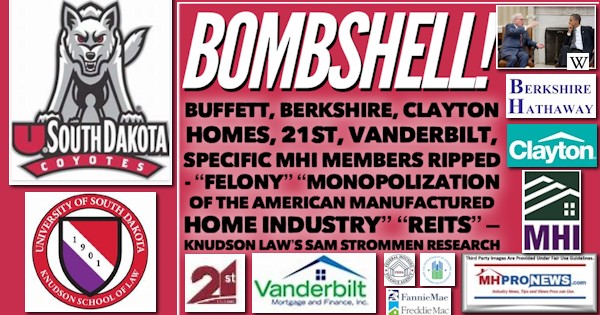
The Senator Tim Scott Example…
With respect to possible deception, there is Senator Scott’s portion of this matter in the hearing.
Once more, it should be noted that it is not uncommon for lobbyists to provide such questions to a candidate in a confirmation or other hearing via a friendly lawmaker. Senator Scott has been paid by the MHI PAC, per Open Secrets. This is not to imply that Scott was wittingly doing something improper. While several senators and nominee Fudge apparently worked together or ‘colluded’ to do a bit of Capitol Hill theatrics that MHI hopes to capitalize upon, that does not necessarily imply that the senators or Fudge wittingly engaged in this behavior. They need to be questioned about it, but fairness should be shown to each.
By contrast, it is MHI that has placed themselves as the nexus of this orchestrated bit of hearing dramatics. The evidence arguably reflects that MHI arranged this collusion for their own benefit and that of their major brands.
MHI not only implied that they gave Sen. Scott (SC-R) that questions he asked, there is visual evidence for that while he spoke on camera. In the video below, Sen. Scott glanced down at something and he partially misread it. He says “manufacturing housing,” not “manufactured housing.” That verbal error is later repeated three more times by Sen. Scott.
This is perhaps subtle from outsiders looking in. But this is a significant error for thousands of manufactured home or manufactured housing industry professionals to errantly say “manufacturing housing.” Let us note anew that this is not intended to slight Senator Scott. The spotlight here is less on his verbal slip, and more on how MHI misreported it.
Once more, here is the relevant part of the transcript, per MHI, which clearly DOES NOT reflect how Sen. Scott misspoke.
Quoting MHI’s email to member: “Manufactured1 [sic, because Senator Scott clear says in the video above “manufacturing” not “manufactured”] housing has a diversity within its construct, and I would love to hear that you have an interest and perhaps even a passion for making sure that we continue to prioritize manufactured1 [sic: again, Scott says “manufacturing”] housing as one of the ways for us to lower the cost and make homeownership more possible for more Americans. Have you done any homework on manufactured1 [sic: for the third time, Senator Scott said “manufacturing”] housing?”
If this was ‘edit’ was a one off by MHI, it would perhaps be forgivable as an effort to clean up, so to say, the misspoken words by Senator Scott. But that ignores the point that MHI is arguably engaged in a pattern of improper behavior that includes, but is not limited to, deliberately misrepresenting statements in committee hearings to their readers. As industry professionals, had Scott’s words been properly recorded in the MHI provided transcript, savvy manufactured home professionals or investors would have spotted the error immediately. As it is, because MHI likely knows that few people click through to watch the video when the ‘transcript’ is provided, MHI arguably made yet another play at pulling the wool over the eyes of their own members.
For emphasis, this example is reminiscent of the troubling episode during the Obama-Biden Administration when MHI massaged a key exchange between then Senator Joe Donnelly (IN-D) and then CFPB Director Richard Cordray (see report linked here).
Indeed, not one but two senior level MHI professionals left that Arlington, VA based trade association after making interesting admissions in writing.
One was Gooch’s predecessor, Jason Boehlert. He said the following to MHProNews, after MHI had been promising – and continued to promise afterwards – that they would deliver on the very thing that Boehlert flatly said was not going to happen. The topic was the so-called “Preserving Access to Manufactured Housing Act.” It purportedly sought to change part of Dodd-Frank. Whether or not the goal was sound was almost irrelevant. The bill was never going to pass, nor did it.
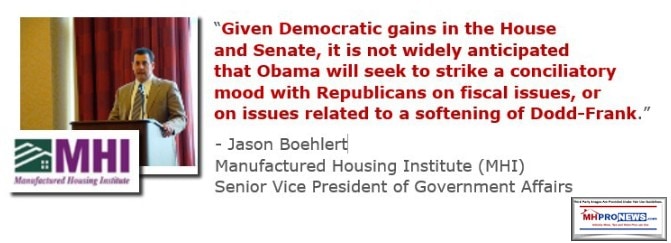
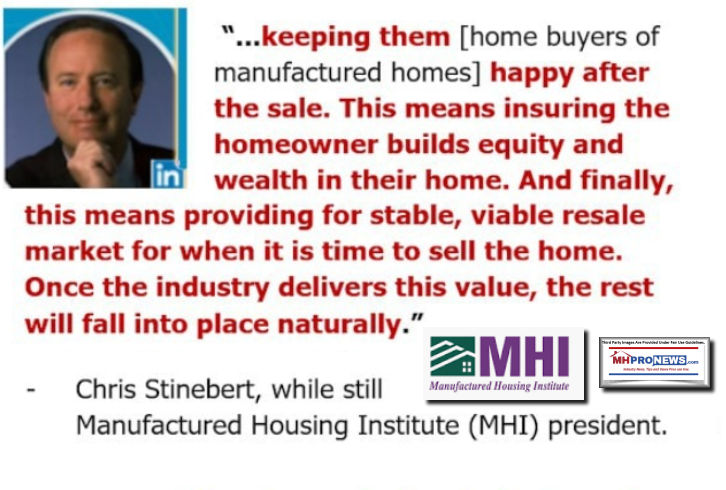
Reframed, MHI was fine with changing or ignoring in their ‘news and updates’ to members what was said in a consequential HUD nomination hearing. Several have claimed that they have a history of such machinations.
MHI also apparently did so to arguably accomplish these things.
1) Make themselves look good to their trusting, but possibly unwitting members.
2) Keep HUD Secretary nominee Fudge from either knowing about a law that could help potentially millions of Americans while posturing support for affordable manufactured homes.
3) By doing so, that would divert attention away from an authentic solutions that could potentially save taxpayers billions of dollars a year, while putting more Americans – especially minorities or lower income whites – on the path of wealth creation.
Regardless of politics, few would question these
factual statements from former HUD Secretary Carson.
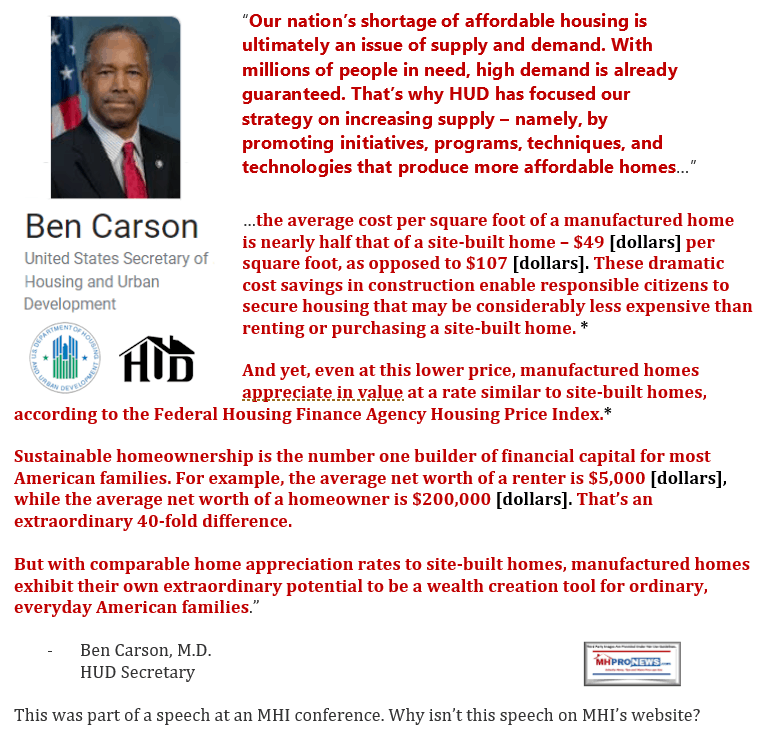
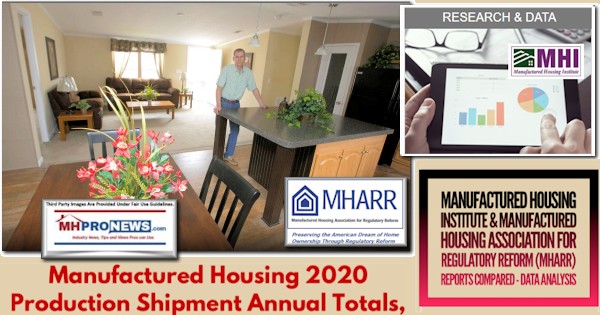
Cui Bono? Who Benefits?
Good investigators and reporters are supposed to keep several things in mind as they probe a topic. Among them is the ancient notion of “Cui Bono,” or “Who Benefits” from a certain behavior, action, or failure to act?
MHProNews notes that there should be a healthy skepticism when it comes claims being made by MHI about the implementation of a federal law – i.e. the MHIA – that was passed over 2 decades ago. That is especially true as they admitted that the law is still not being fully and properly implemented. While MHARR has consistently pushed for the full and proper implementation of the 2000 Reform law, MHI has vacillated back and forth for years. One example of that that claim is in the report linked below.
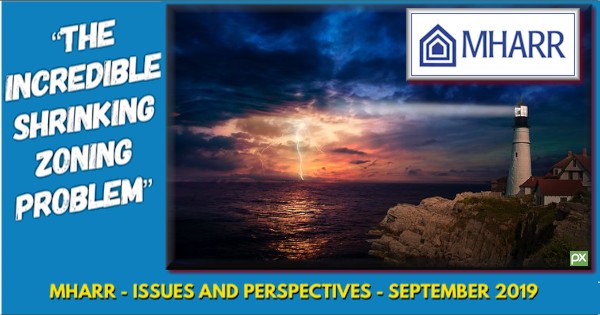
But there are numerous examples of MHARR making such a case while MHI gyrates. While Gooch admitted in a letter to Sec. Carson that “enhanced preemption” should be implemented, how then can one explain that MHI has not use those words on their own website for years? By contrast, MHARR has used the publicly and repeatedly. Both points are illustrated by the respective screen captures of searches on each trade group’s website that are shown below.
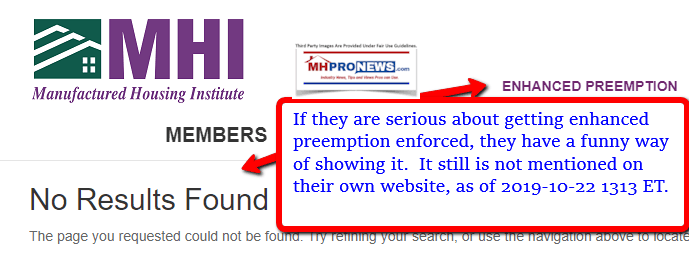
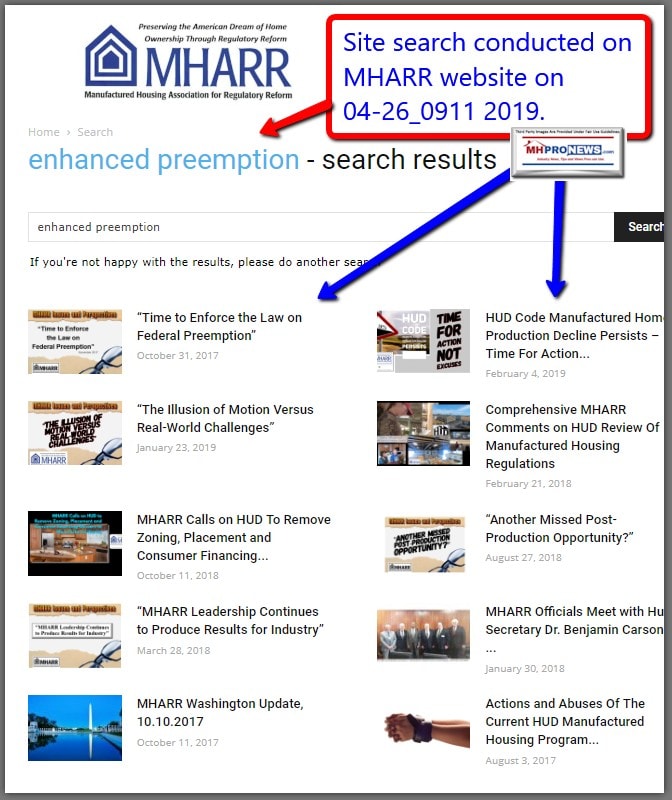
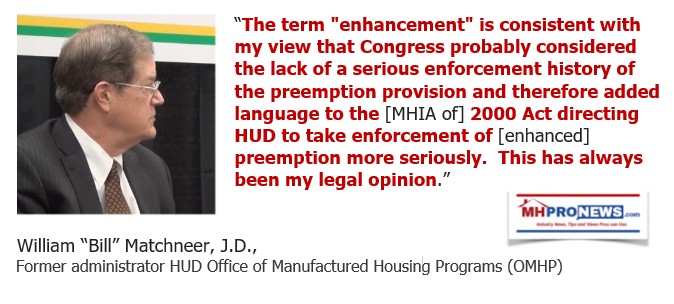
So, what might be the purpose of such a ploy by MHI to thwart a good law that would benefit thousands of industry professionals and potentially millions of affordable housing seekers? That is not the classic 64K query. Rather, it is more like the $64 billion dollar question.
Sam Strommen from SDU’s Knudson Law’s recent legal research project makes the case that MHI is working with the major producers of HUD Code manufactured homes to effectively rig the market in a way that fosters consolidation by those big three producers. Industry underperformance helps consolidation. Underperformance, limiting financing, or zoning and placement barriers are all barriers of entry, persistence, and exit, as MHI member Andy Gedo agreed in a public debate with this writer for MHProNews. Ironically, the Kevin Clayton of Berkshire Hathaway owned Clayton Homes confirms Gedo’s point.
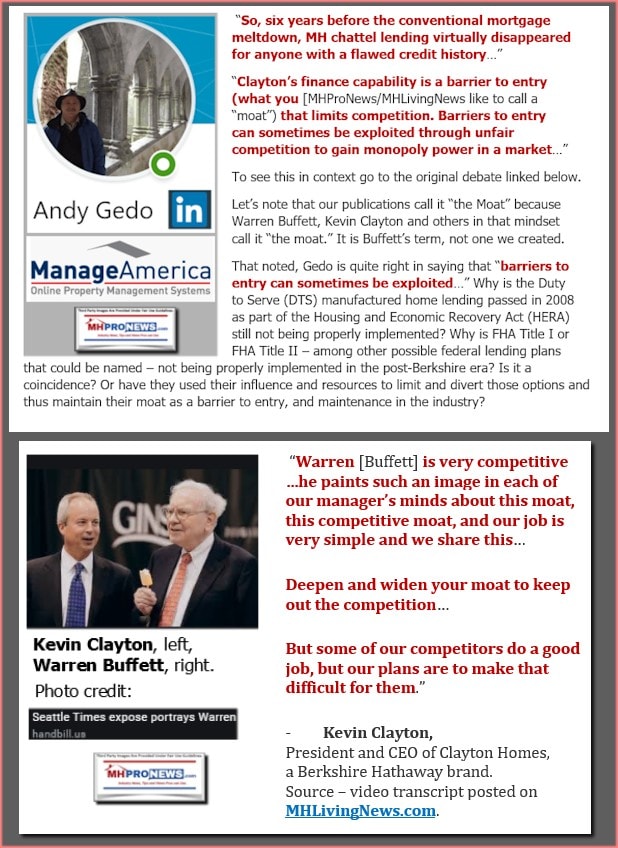
So too does the published statements by publicly traded firms that are the members of MHI. Merely having an antitrust statement clearly does not prove that MHI is not at some level, as Strommen and others have alleged, working to consolidate the industry at the cheapest possible price. The quotes below are examples of that claim.
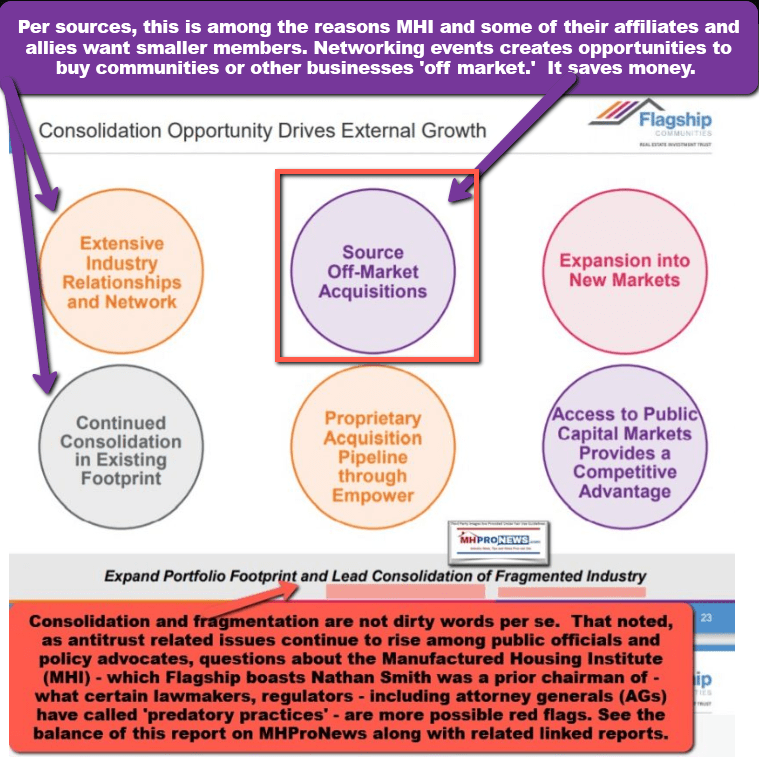
Given the opportunity by MHProNews to respond to each of those allegations, neither Berkshire Hathaway, Clayton Homes, MHI, or their outside and allied attorneys took that opportunity.
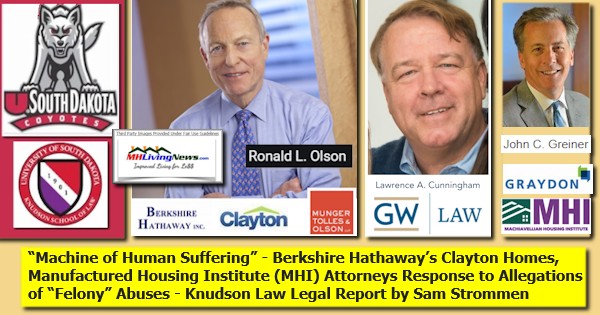
Thus, the allegation at this point publicly stands unchallenged. The reasons why they did not challenge these claims could be elaborated upon, but reports linked above delve into those issues in detail.
What is certain is that for years failure to address zoning and placement has driven numerous independents out of business. MHI’s own website provides evidence of that claim.
Again, MHI and their major brands have been asked about this previously and repeatedly. They have confirmed at various times the MHProNews inquiries, but MHI and Clayton have nevertheless failed to avail themselves of any opportunity to clarify, confirm, or deny the evidence against them and their big corporate masters. Meanwhile, some industry members have made it plain that there is talk but no measurable action by MHI.
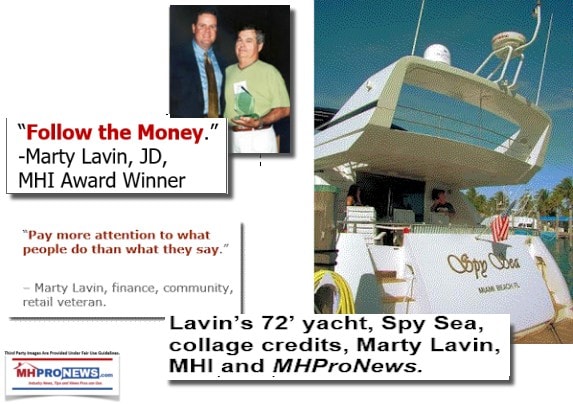
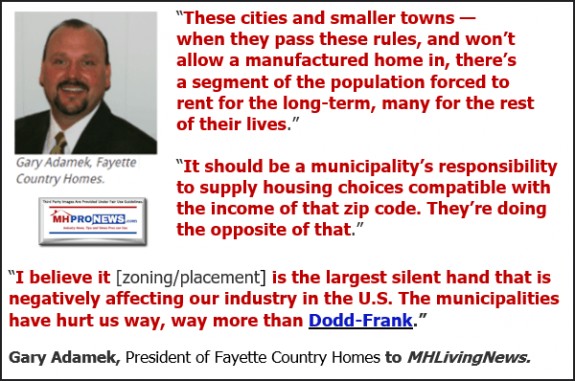
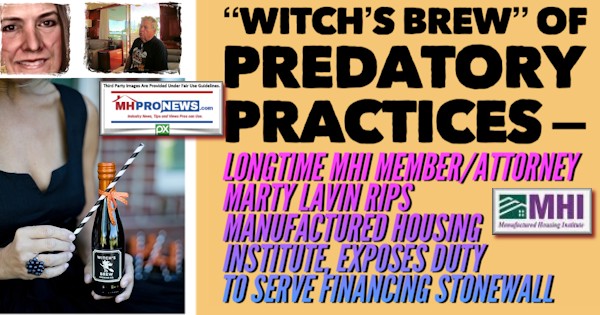
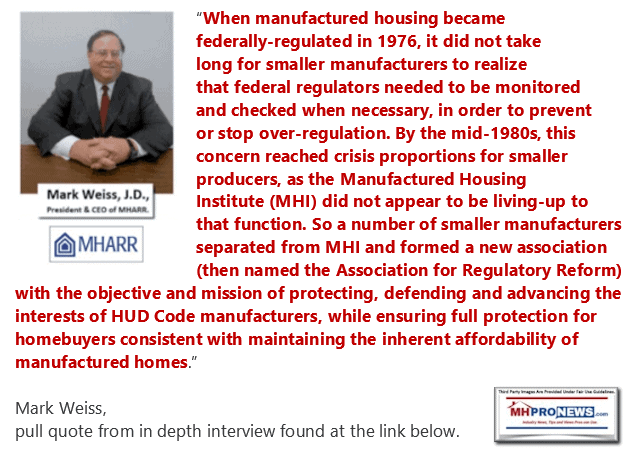
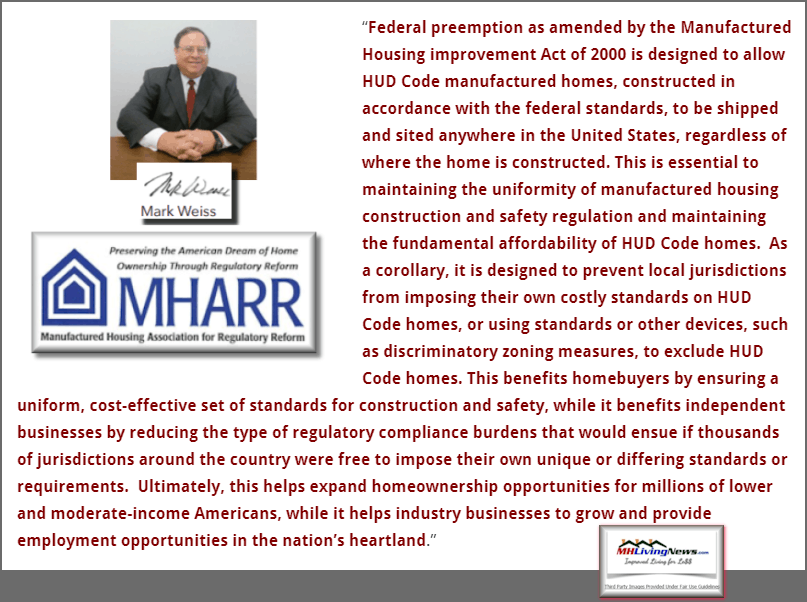
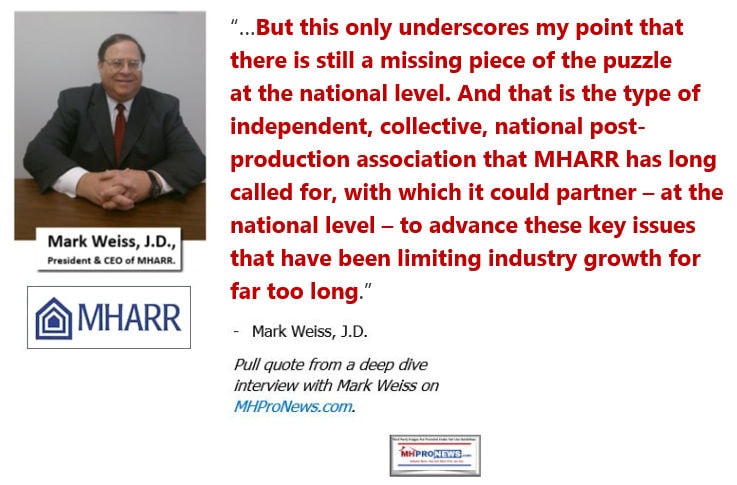
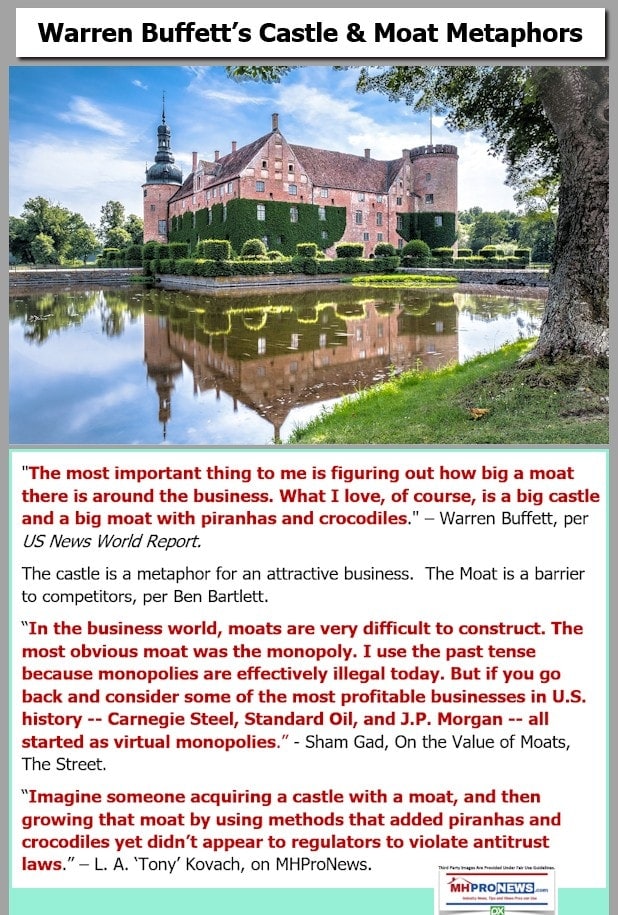
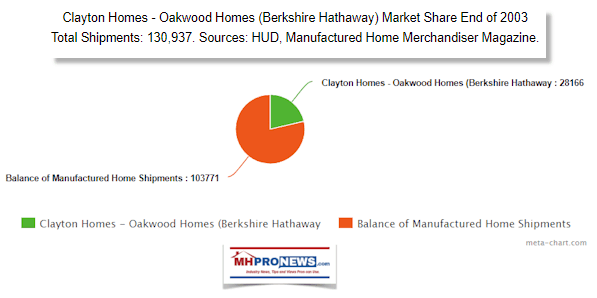
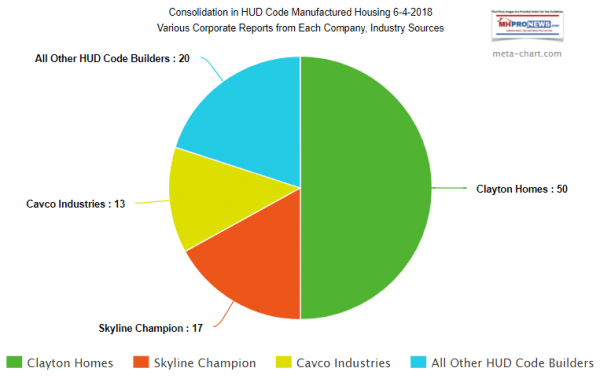
Additional Analysis, Commentary, Takeaways and Bottom Lines
It must be stressed in fairness that nominee Fudge, was perhaps played by MHI. To protect sources, that is not going to be addressed by MHProNews at this time. Rep. Fudge should be given the chance to clarify and clean up and miscommunications as was ‘reported’ by MHI above.
- If Fudge intends to fully and properly implement the enhanced preemption clause of HUD Code manufactured housing under the MHIA of 2000, there will be scores of professionals who would welcome and applaud such behavior. In fact, consumer groups should embrace that too.
- But, on the other hand, what if nominee Fudge before or after getting into office fails to clarify – or more importantly – fails to implement the 2000 Reform law? What will happen if the action urged by Rep. Maxine Waters and others is not done by the pending HUD nominee? In that scenario the industry’s independents, and untold numbers of consumers who thirst for affordable home ownership that manufactured homes make possible, will likely have issues. Indeed, taxpayers should be angered by that too, if that occurs.
Senator Scott likewise deserves the opportunity to clean up his misspoken words. But, as noted above, the issue is less his verbal slips than it is that MHI has repeatedly misinformed their readers. Had it never happened before, perhaps it would be less consequential. But given years of arguably underhanded tactics that benefit larger companies at the expense of smaller ones, this periodic issue with MHI should not go unaddressed.
Conclusion
If the Biden-Harris team are serious about creating more affordable home ownership, manufactured homes offer the most proven path to achieve that yet devised in America. That is one of several takeaways from decades of research that spans Democratic and Republican administrations. Affordable home ownership should be bipartisan or nonpartisan. But oddly, much of that useful research third-party research is missing from the MHI website. Is that mere sloppiness or part of a pattern that postures behavior in emails to members but then does not post those same emails on their own website where others can cross-check MHI’s claims and history?


But instead, as research reports like Strommen’s reflects, there is clear evidence of market manipulation. Dr. Donna Feir, touching on the financial aspect of this issue for her research for the Minneapolis Federal Reserve, made a similar point in the quote below. She specifically cited research that named Clayton Homes and their related lending as the suspects in the matter.
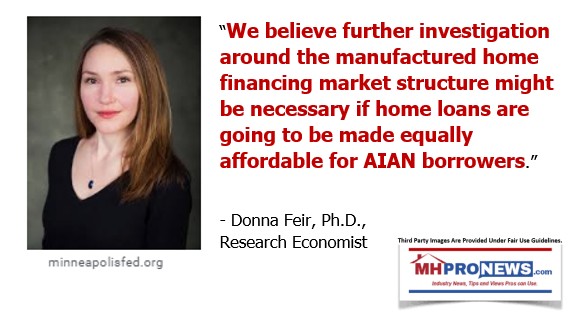
Rep. Maxine Waters and some of her other then-house colleagues has also called out Clayton Homes as part of the problem, referring the matter to the Consumer Financial Protection Bureau (CFPB).
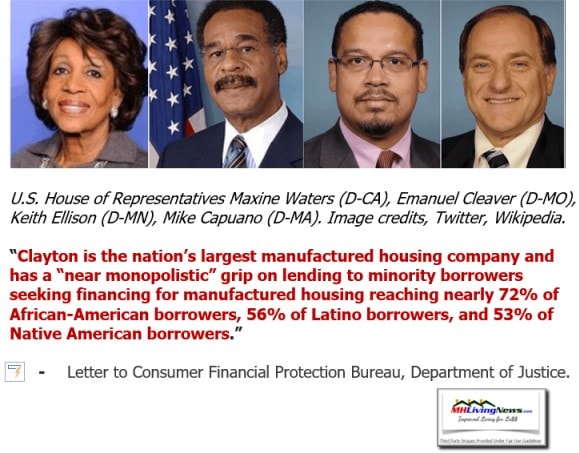
More recently, even Clayton Homes hometown media ripped that company, as the local news report below reflects.
Arguably more important is the deep dive based upon revelations that connect the dots from John satirical expose of Buffett, Clayton, and other MHI member/brands, explored in depth in the report below.
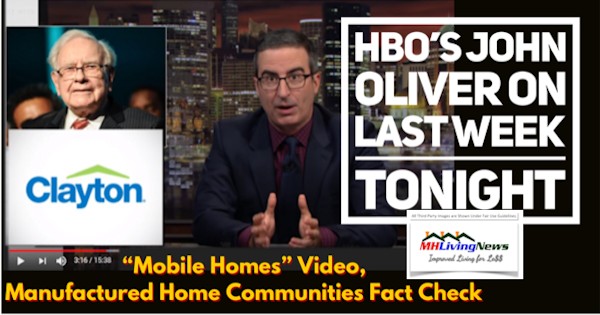
It is tragic, but perhaps emblematic of our epoch when big corporations, their surrogates, and their proxies undermine the proper operation of the free market. Will lawmakers or nominee Fudge step up and act to thwart this scurrilous and harmful behavior?
Either way, MHProNews will monitor and report.
As longtime readers here, on Capitol Hill, in Washington, DC, and across the country know, MHProNews follows the money, the facts, and the history to connect the dots on issues both subtle and blatant. That is what makes us the runaway most-read trade media serving this misunderstood industry. And that misunderstanding of the industry itself is cause to explore MHI and their years of purported failures while posturing being the industry’s leaders.
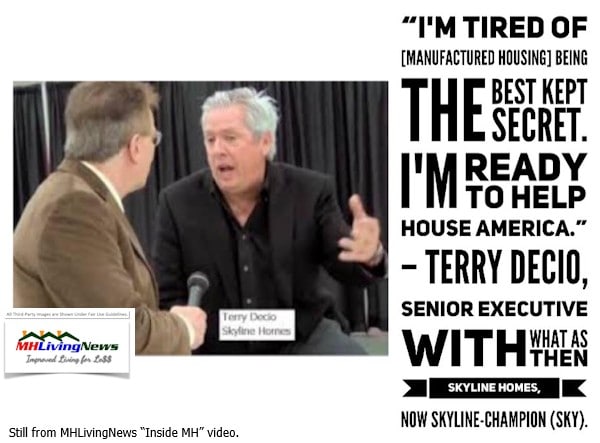
Strommen’s legal research report referred what is occurring inside manufactured housing that has hobbled the industry from within as a “Machine of Human Suffering.”
Indeed, thousands of professionals lost their life’s work entirely or at reduced valuations due to purported market manipulations. Millions that might have been homeowners are trapped in rentals. Taxpayers are footing the bill to the tune of billions of dollars annual for housing subsidies that may not be needed if the marketplace was functioning properly.
Who benefits? A chosen few insiders who are politically, financially, and media connected. Who is harmed? The vast majority of others, directly and/or indirectly.
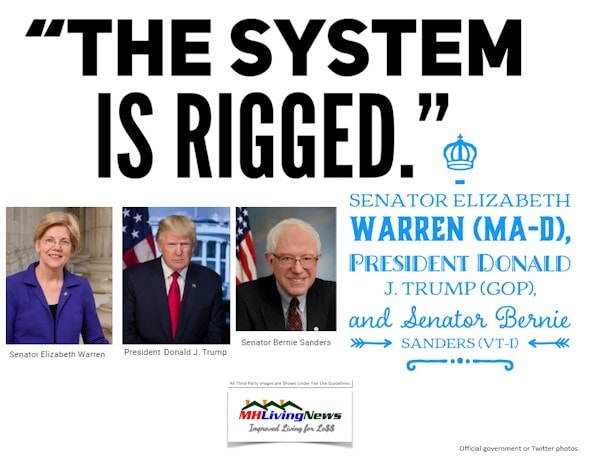
To learn more, see each of the linked and related reports above and further below.

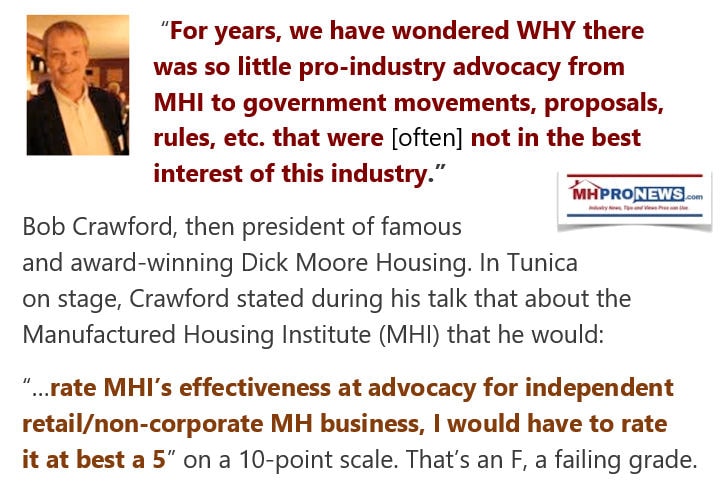
Stay tuned for more of what is ‘behind the curtains’ as well as what is obvious and in your face reports. It is all here, at the runaway largest and most-read source for authentic manufactured home “Industry News, Tips, and Views Pros Can Use” © where “We Provide, You Decide.” © ## (Affordable housing, manufactured homes, reports, fact-checks, analysis, and commentary. Third-party images or content are provided under fair use guidelines for media.) (See Related Reports, further below. Text/image boxes often are hot-linked to other reports that can be access by clicking on them.)

By L.A. “Tony” Kovach – for MHProNews.com.
Tony earned a journalism scholarship and earned numerous awards in history and in manufactured housing.
For example, he earned the prestigious Lottinville Award in history from the University of Oklahoma, where he studied history and business management. He’s a managing member and co-founder of LifeStyle Factory Homes, LLC, the parent company to MHProNews, and MHLivingNews.com.
This article reflects the LLC’s and/or the writer’s position, and may or may not reflect the views of sponsors or supporters.
Connect on LinkedIn: http://www.linkedin.com/in/latonykovach
Related References:
The text/image boxes below are linked to other reports, which can be accessed by clicking on them.

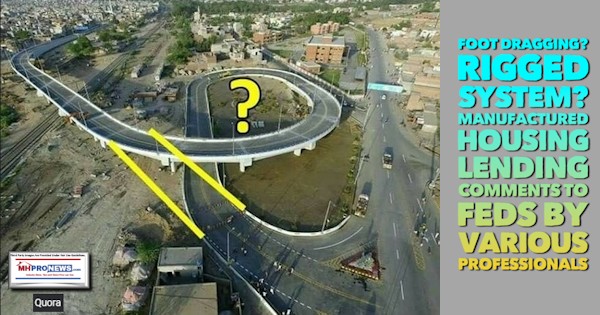
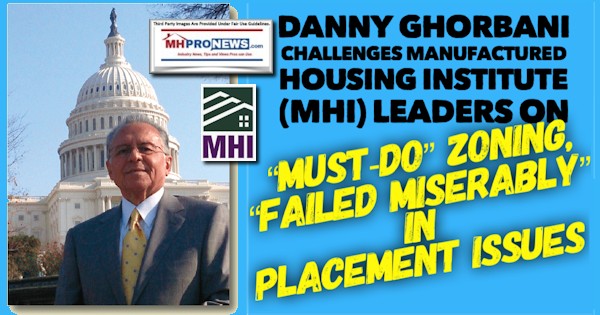
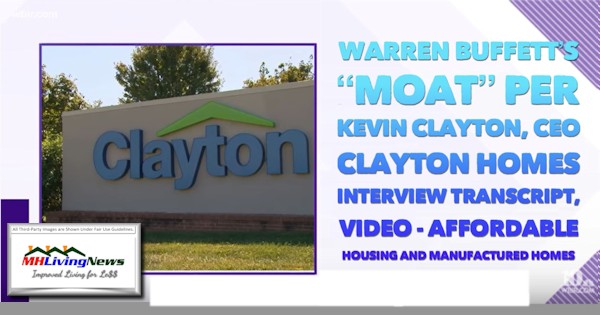

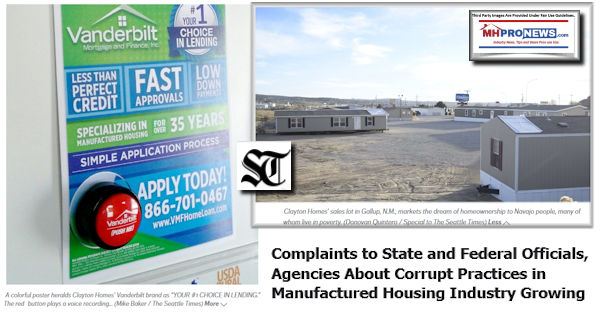

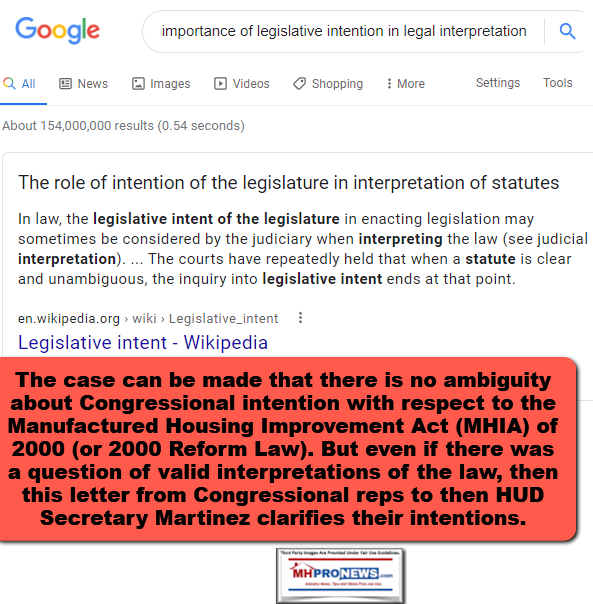

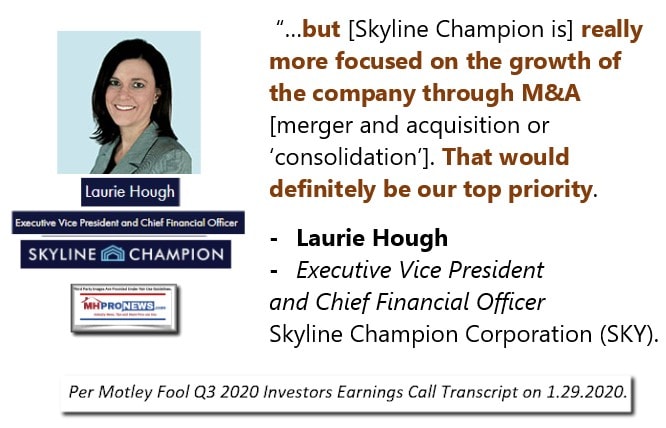
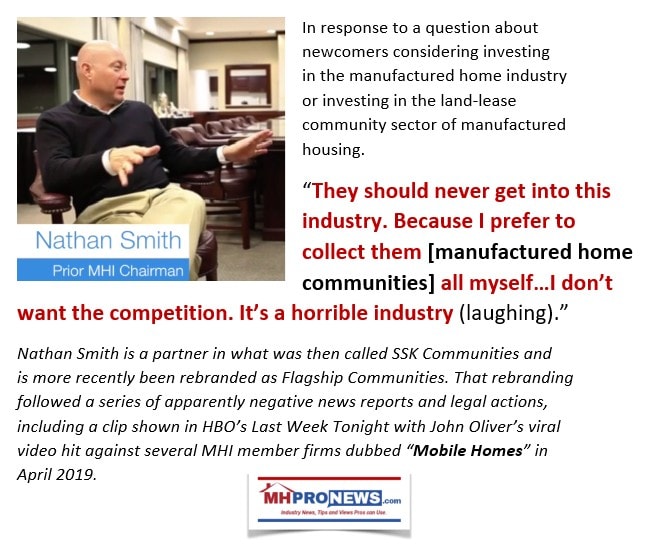
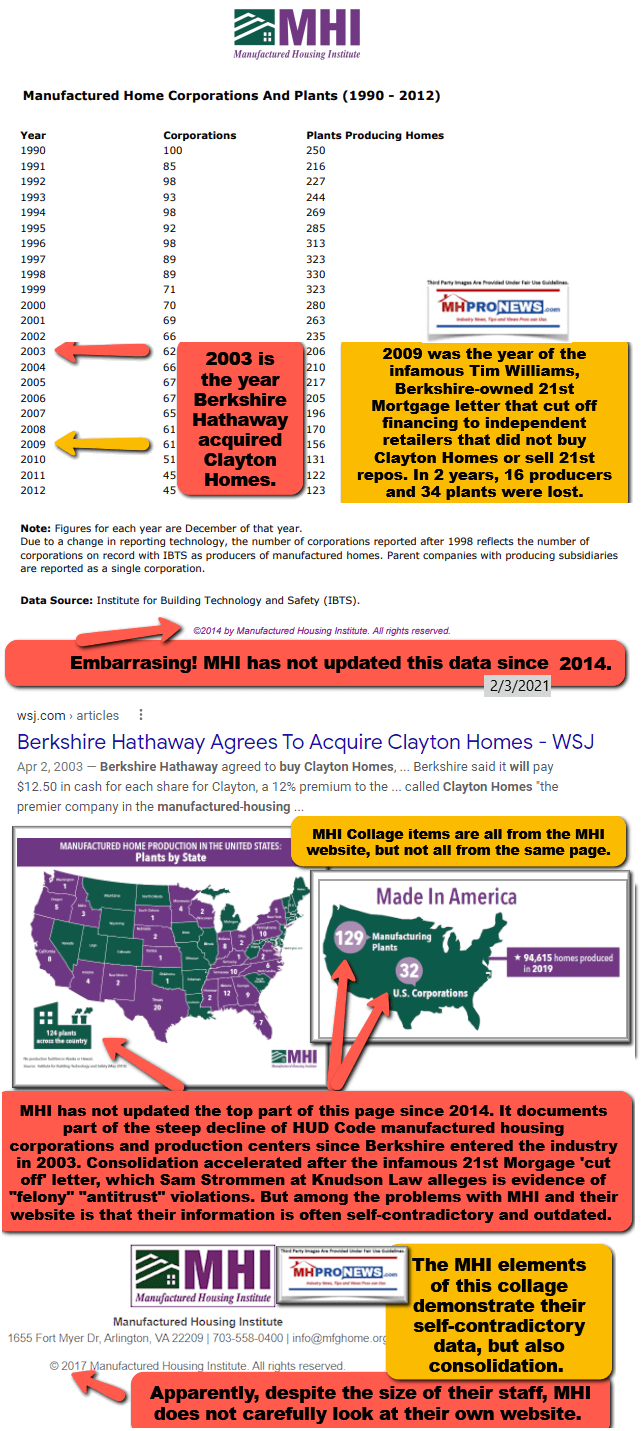
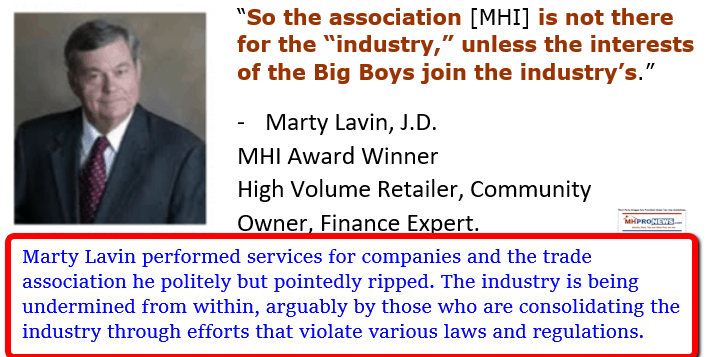
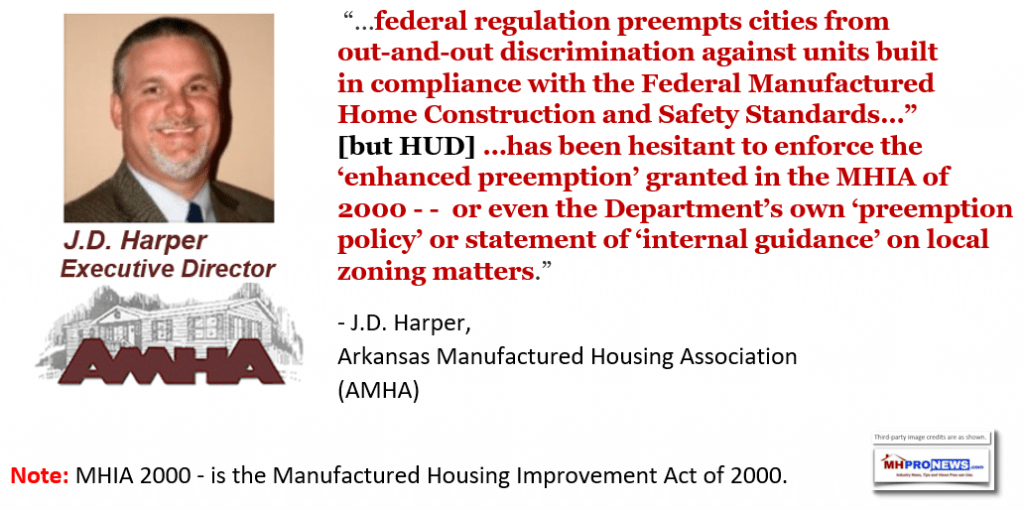

![DidntWantToMeetWarren[Buffett]BecauseGuyBuysSellsFoundImperfectMarketNotValueAddSocietyZeroSumGameParasiticBillGatesPhotoMicrosoftLogoGatesFoundationLogoQuoteQuotableQuoteMHproNews](http://www.manufacturedhomepronews.com/wp-content/uploads/2020/07/DidntWantToMeetWarrenBuffettBecauseGuyBuysSellsFoundImperfectMarketNotValueAddSocietyZeroSumGameParasiticBillGatesPhotoMicrosoftLogoGatesFoundationLogoQuoteQuotableQuoteMHproNews.jpg)
